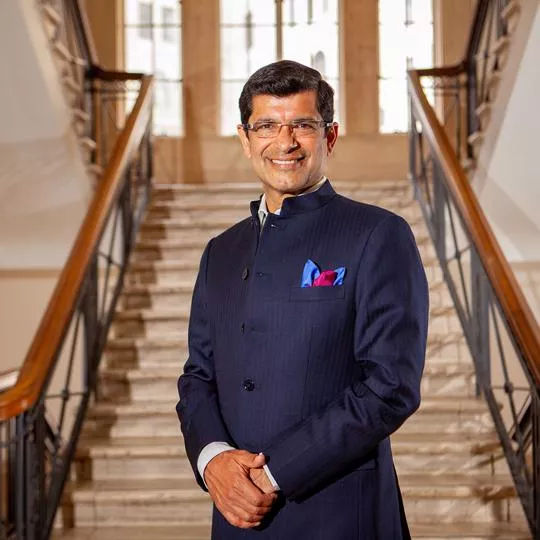14 November 2023
UK universities trapped in 'triangle of sadness', King's Vice-Chancellor says
UK higher education is envied around the world – but the system has now reached its best-by date, a new paper argues

Read the paper
The UK has one of the finest university systems in the world – envied and emulated by others – which provides one of the best graduation success rates globally, with nearly 80 per cent of those who start university completing their course, as compared to 64 per cent across the OECD and 66 per cent in the US.
Yet UK universities are trapped in a “triangle of sadness” between aspiring students who feel burdened with debt and uncertain prospects, a stretched government that has allowed tuition fees to fall far behind inflation, and beleaguered university staff who feel caught in the middle, argues a new paper by Professor Shitij Kapur, Vice-Chancellor of King’s College London.
The UK has the most indebted graduates in the world, he says, highlighting that 90 per cent of those who complete a degree take out a loan, with an average debt of around £45,600 – a worse situation than even in the US, where roughly 60 per cent of graduates take out a loan, with an average debt of only $28,400.
While the paper recognises UK students who fail to meet a minimum salary threshold do not pay all their loan back, it says it is an “absurd situation” that in England 73 per cent of those who enrolled in 2022/23 may default.
Despite this, the current level at which tuition fees are set is not enough to deliver world-leading teaching and research, Kapur argues, and in the UK the government makes the lowest proportional contribution to university education in the OECD, with students and other private sources contributing more than double the average.
This insufficient funding has stretched institutions’ resources and heaped pressure on staff, leading to 100 of 144 UK universities reporting an operating deficit in 2021/22 and helping to create the conditions for one of the longest-running industrial disputes in the sector’s history.
The government’s goal of turning the UK into a “science and technology superpower” is also at risk, the paper says, with UK institutions producing a lower share of the highest-quality academic papers than they once did, at the same time as China’s research output has grown in both volume and quality.
More generally, the state of the higher education sector shows little sign of improving, as 131,000 extra 18-year-old school and college leavers in the UK are projected to be seeking university admission by 2030 – the equivalent of setting up four new King’s College Londons a year till the end of the decade.
Kapur says that with the current fee regime, no university will have the ability or incentive to accommodate these students, and that the present system has “reached its best-by date”.
He sets out three steps that would help ensure UK universities serve the future of the nation and students.
1. Stop the erosion of resource and decline of quality
The £9,250 student fees, set in 2012, are now worth around £6,000 in real terms, and in the last three years alone inflation has eroded 20 per cent of universities’ resources.
Absent any relief, universities will be forced to recruit more and more international students in order to afford to teach their domestic counterparts, or worse still, the whole system will be allowed to decline in quality.
“The UK’s ambition to become a science and technology superpower cannot be left to the vagaries of decisions about study destinations by students and affluent parents in overseas nations,” the paper says.
It therefore calls for a system of inflation-related uplifts in student fees – a move that was previously planned under the May government – linked to measures of quality, as determined by the Teaching Excellence Framework.
2. Secure our research leadership and economic prosperity
The UK’s future prosperity depends on its high-tech services and industries and its ability to generate competitive advantages in the green economy, AI and digital sectors.
Yet the university system cannot respond to future research opportunities if it is straddled with making up a 20 per cent deficit in the cost of every research project it undertakes, which currently occurs because UK research funding bodies calculate the full economic cost of research but deliberately pay only 80 per cent of it – expecting the rest to be found from other sources.
If this continues, universities will be forced into doing research only if they can recruit more international students or replace domestic students with international. This “Faustian cross-subsidy” must stop, the paper says.
It argues the government must fund the complete cost of the research it sponsors, while at the same time recognising UK universities have to catch up to institutions in the likes of Germany and the Netherlands, where there is much greater research collaboration with industry.
3. Create a sustainable system for the students of tomorrow
Even without increasing the current rate of participation in higher education, UCAS estimates there will be 38 per cent more UK students seeking university places by 2030 than there are today.
Funding this growth under the country’s current undifferentiated system will be a challenge, the paper says. As it stands, nearly 150 universities charge students a uniform fee – regardless of the cost of the subject, the demand for it, or its economic advantage – and attempt to teach most courses.
At the same time, a single regulatory body deals with all universities – from the world-leading, research-dominant Oxbridge to a regional talent provider – in a single framework. It is “neither a real market system, nor a strategically managed system,” the paper argues. Instead, it proposes greater specialisation across institutions and greater cost-effectiveness within them.
In California – a state with a GDP the size of UK, and with as many world-leading universities – there exists a well differentiated system of research universities, teaching universities and community colleges that serves the economy and individuals well.
Professor Shitij Kapur, Vice-Chancellor and President of King’s College London, said:
“The UK higher education system is the envy of the world and one of the crown jewels of this country – but all jewels need repolishing and an occasional reset. This is not about figuring out what UK universities need in order to be world-leading. This is about how we secure our world-leading universities to serve our economic future and our social ambitions. To do this, we must stop the erosion and decline of quality, secure the science and technology leadership that supports our economic prosperity, and design a sustainable system for all our school and college leavers – those who go to university and those who pursue other pathways.”

